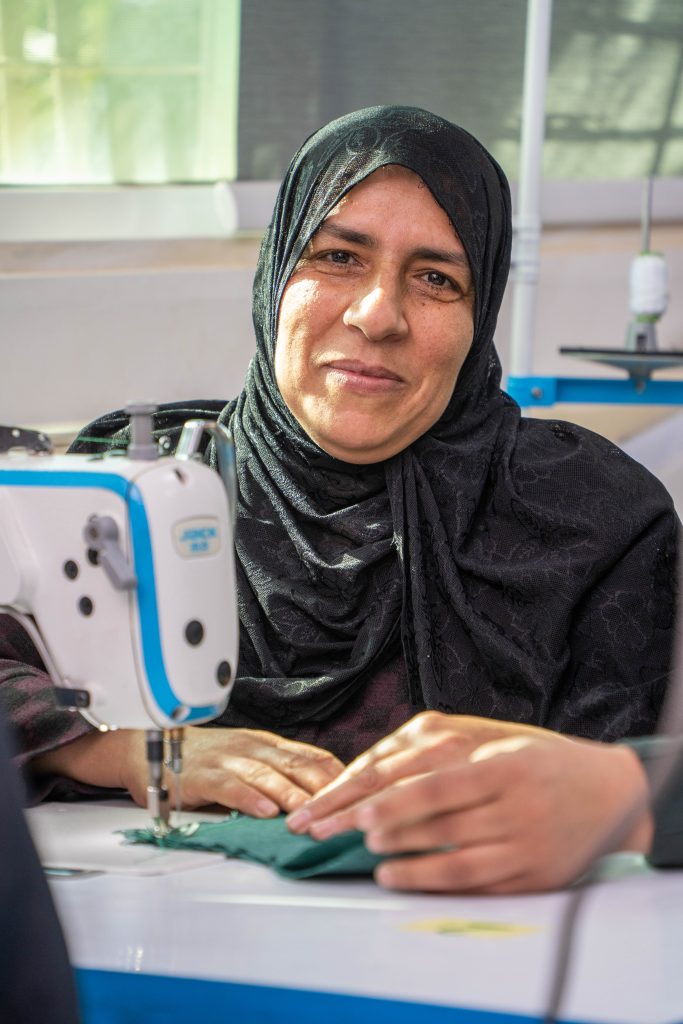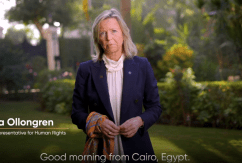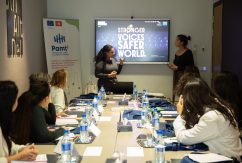Taghreed: From the Turmoil of War to Empowerment
Fleeing her home in 2013, Syrian Taghreed Al-Issa faced challenges as the head of her household, intensified by her daughter’s cancer diagnosis. A training programme in tailoring at Muwagar Oasis Centre, supported by the EU Regional Trust Fund in Response to the Syrian Crisis – the Madad Fund, and UN WOMEN, changed her life. Mastering sewing skills, Taghreed became a self-employed tailor, empowered and part of a supportive community of women.

From War’s Wake to New Beginnings
Taghreed, a 43-year-old Syrian refugee, found herself thrust into the challenging role of head of the household in 2013 when she and her family fled war-torn Syria for the safety of Jordan. The decision to leave the country was not an easy one; it was triggered by a harrowing night when their neighbourhood was bombed, and Taghreed’s husband was seriously injured. The family members were separated for almost six months and did not know what would happen to them until a happy reunion in Jordan.
“At 4am we were attacked. They bombed the cars parked outside our house. I looked at my husband and he was thrown high into the air before landing on the ground. In the morning, my uncle urged us to go to the Jordanian checkpoint. I had no contact with my husband for months. It was only six months later that he managed to rejoin us in Jordan.”
Life as a refugee brought its own set of challenges. The family initially lived in a tent, and as a single woman with eight children, Taghreed faced rejection and hardship when she asked for help. But her determination prevailed and she managed to overcome adversity.
“One night our tent collapsed and we were without shelter until the morning. I held onto my children to keep them warm in the cold. But luckily we managed to get through it all.”
The challenges became even greater when one of Taghreed’s daughters was diagnosed with cancer, a disease for which there was no cure in Jordan. Despite these overwhelming circumstances, Taghreed was a rock of strength, shouldering the responsibility of caring for her family while her incapacitated husband recovered from the physical and emotional scars of war.
Tailoring Training: Life Changed with Every Stitch
Taghreed’s life took a positive turn when she enrolled in a tailoring training programme at the Muwagar Oasis Centre in Jordan. The programme taught her skills in sewing and tailoring, from simple items such as hair bands to more complex tasks such as making school uniforms.
“We first learnt how to make hair bands and coasters. Then we moved on to sewing school uniforms and more complicated garments,” explains Taghreed.
With her newly acquired skills, Taghreed went from being a trainee to a self-employed seamstress. She began sewing at home, altering clothes, experimenting with new designs and offering services to her community. Her ambition grew and she aspired to specialise in making certain items such as school uniforms. The positive impact of the training was not limited to Taghreed’s professional life, but also extended to her personal life.
“Becoming a tailor has always been my dream, and fortunately that dream has now become a reality. Despite the challenges I have faced, the last few months have been a blessing and God has compensated me for the difficulties I have gone through.”
This initiative, supported by the EUTF Syria – Madad and implemented by UN WOMEN, aimed at empowering vulnerable women like Taghreed.
Madad: Empowering Women through the “Resilience and Empowerment of Vulnerable Women” Project
The training Taghreed received was part of the “Resilience and Empowerment of Vulnerable Women project: The Future of Jordan’s Growth and Stability” project. This project, implemented by UN WOMEN, aims to strengthen the resilience of women affected by the Syrian crisis, including women like Taghreed who have sought refuge in Jordan.
By improving access to recovery and livelihood opportunities combined with comprehensive protection services, the programme aims to empower women on multiple fronts. In particular, the project has engaged men as partners, champions and advocates for women’s empowerment, including their participation in the labour market.
This approach created an enabling environment for refugee women and promoted labour market participation, economic empowerment and family self-reliance. Taghreed’s participation in the programme’s skills training measures and opportunities is evidence of its impact on Syrian refugee women, especially in the camps.
In its second phase (2021-2023), the programme expanded the Muwagar Oasis Centre model, contributing to Jordan’s stability, inclusive economic growth and sustainable development. The initiative aimed to support women to enter the labour force and, more importantly, to enable them to stay there to ensure sustainable economic activity.
The European Union through the EUTF Syria – the Madad funded this project. As a leading force in the international response to the Syrian crisis, the fund addresses critical needs, providing support to millions of Syrian refugees and their host communities. The impact of this funding is evident in the stories of resilience and empowerment, such as Taghreed’s, creating a path towards stability and growth for vulnerable women in Jordan.
Beyond Skills: Building a Community and Forging Futures
The training not only taught Taghreed valuable skills, but also fostered a sense of community and friendship among the participants. They became like sisters and supported each other not only in their craft but also in the challenges that life threw at them. The Muwagar Oasis Centre became a sanctuary where Taghreed not only honed her tailoring skills but also found a supportive network of friends.
“For example, if someone had trouble with the thread or had a broken needle, we helped each other. We are like sisters who are always there for each other. When my husband gets sick, they come to visit. Once when I had to take my daughter to hospital, they came there with us. Our bond is incredibly strong. This place means a lot to me.”
Taghreed’s optimism and ambition for the future are palpable. She has a busy schedule and occasionally has to turn down jobs because there is too much demand. Social media, particularly a Facebook page managed by one of her daughters, has become a platform to showcase her work and attract clients. In her advice to other women, Taghreed emphasises the potential for financial stability through learning to sew and encourages them to follow in her footsteps and empower themselves to support their households.
“I advise any woman who doesn’t have a certificate to learn how to sew. It may not lead to great wealth, but it can provide financial stability and help you support your household and your children.”





























 Syria
Syria 



